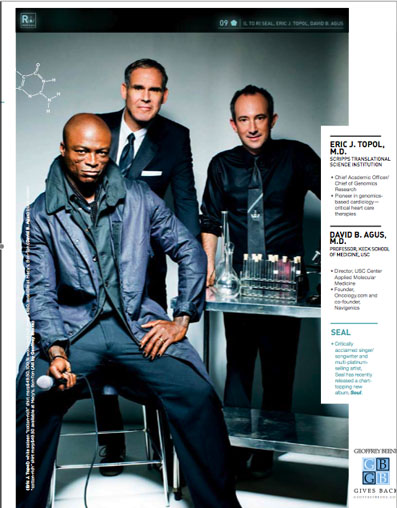
Circa 2009: Topol (middle) hanging out with Seal at a GQ Magazine photo shoot.
Digital health is ready for prime time.
Dr. Eric Topol, director of the Scripps Translational Science Institute, chief academic officer of San Diego-based Scripps Health and one of GQ's 2009 "Rock Stars of Science", was featured Thursday night on NBC's Rock Center with Brian Williams, and he showed off a number of technologies familiar to readers of MobiHealthNews. For the general public, however, the segment promises to be eye-opening.
"It sounds like science fiction," host Brian Williams said in the teaser before a commercial break, "but Dr. Nancy Snyderman reports on how your smartphone may change medicine, including warning you of a heart attack."
In a segment called "iDoctor," Snyderman, NBC News's chief medical editor, called Topol the "foremost expert in the exploding field of wireless medicine," and Topol has been an unabashed supporter of wireless technologies, even as others have dropped the label.
Topol, a cardiologist, told Snyderman, that billions of dollars are wasted every year for screening and unnecessary medications because people are "being treated like a cattle herd" in the frantic fee-for-service, litigation-happy world. "Medicine today is about as wasteful as one can imagine," he said.
Topol expressed the view that a third of drugs prescribed are "total waste" and mass screenings represent "medicine dumbed down" by treating everyone the same.
To show how he believes medicine should be practiced, Topol demonstrated the recently FDA-cleared AliveCor iPhone ECG on a patient with multiple heart ailments. Snyderman said it saved the patient a $100 technician's fee.
He then imaged the patient's heart with a GE Healthcare Vscan handheld ultrasound to image the patient's heart. (GE holds a 49 percent stake in NBCUniversal, a point Snyderman did mention.) The NBC physician noted that a separate test would cost $800 after Topol said making the ultrasound part of the physical exam could eliminate 70 percent to 80 percent of the 20 million ECGs performed in the U.S. every year – a potential savings of as much as $12.8 billion. And a smartphone is much less invasive than a full 12-lead ECG machine.
Snyderman said she was "surprised" that the technology did not intrude on the patient-physician relationship.
"I think it helps make the interaction much more intimate because now I'm sharing the results in real time," Topol said. "We can make the office visit an enjoyable thing," he added. Plus, many doctor visits don't even have to take place in the office; a patient and physician could be looking at readings simultaneously from a home device. "Anything that we do can be done remotely," Topol explained.
Topol, who left the Cleveland Clinic after ruffling too many feathers by repeatedly questioning authority, helped get COX-2 inhibitor Vioxx pulled from the market in 2004 for safety reasons. In fact, he has long complained about overuse of prescription drugs. "These days I'm actually prescribing a lot more apps than I am medications," he told Snyderman.
And he is relying more on his smartphone than on traditional medical devices and supplies. "You can take the phone and make it a lab on a chip. You can do blood tests, saliva tests, urine tests – all kinds of things – sweat tests, through your phone. This is a powerful device," Topol said.
Topol, who personally tries to maintain a healthy lifestyle, tested his own glucose on his Sony Ericsson Xperia smartphone with a Dexcom wireless sensor he wears on his abdomen after Snyderman exposed one of his weaknesses, tortilla chips.
After Snyderman asked him if he thought about how he is going to die, Topol said his father went blind from diabetes at age 49 and his mother died of leukemia in her early 50s. He has had his own DNA tested and constantly monitors his own health status, thanks, in part, to a Sotera Wireless ViSi Mobile wrist monitor, which Topol helped develop.
Topol always takes the stairs instead of the elevator and works an hour of exercise into his day, no matter how busy he may be, "trying to live the life he thinks we'll all be living in the near future," Snyderman said.
Topol said Scripps was working on a project to put a nanosensor in the bloodstream that could pick up when the artery lining sheds cells, an early indicator of a heart attack. "And then you will get on your phone a special heart attack ringtone which will warn you within a week or two weeks that you are very liable to have a heart attack," the Scripps cardiologist explained.
It may sound invasive, he said, but it puts the body under "continual surveillance."
As he described in his book, "The Creative Destruction of Medicine," Topol said the future will be a health system focused on the patient, thanks to all the data these gadgets and monitors will turn out.
"The patient [of] tomorrow is the biggest switch. People need to take ownership. They need to seize the moment and seize the data," he said.














